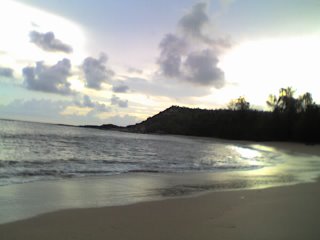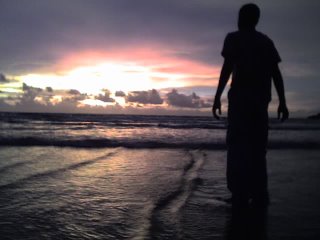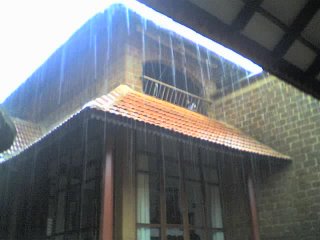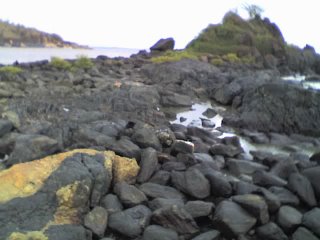I've seen how easy it is to just copy-paste, so here is another Outlook Traveller piece I wrote. The place: Beautiful, beautiful, Gokarna. Next time, blog, I promise I will write exclusively for you.---------------------
Rain is a big event only for those who don't see much of it. Those who see it in plenty scoff at any wide-eyedness about full rivers and rumbling clouds. People in Gokarna talk of a thunderstorm as if it were a tiresome old aunt who coughs too loud when everyone's asleep. For them, monsoon's just a time to wash clothes in smaller batches and make the umbrella the arm-extension of the season. A time when conversations with tourists go beyond giving them directions to the beach.
The conversations begin at Mangalore, where I take the local bus: the only sensible way to get to Gokarna, apparently. If you ask for a taxi (as I did), there will be no mistaking the utter disbelief on the driver's face. "Why spend so much money? Take the government bus." There is just one direct bus to the town, and if you miss that (as I did), then just let the wind and state transport take its winding course. The view from the shut window pane lashed with rain is worth the detours and retours. Don't let all the localites nodding off in the bus trick you into believing there's nothing to see on the way. They seriously have no clue they're living in a world of watercolour.
When I get to Gokarna, I ask for Swaswara, where I'll stay. It's just a month old, so the local name for this beach resort is simply, "
aa hosa jaaga" (that new place). An autorickshaw man volunteers; his vehicle has curtains, big stereos, and a detachable door to keep out the rain. But no meter. I postpone the annoyance of having to haggle, and decide to enjoy the ride. As the autorickshaw the leaves the main town behind, it's as if someone switched off all the ambience. Except for the auto's putt-putt, and an occasional rumble from the skies that seems to shush any chitchat.
After a lot of quiet travelling, the road abruptly climbs onto the rain cloud we've been following. As the autorickshaw man switches off the engine and lets momentum play driver, I let my jaw drop. I can't believe I've seen white froth recede from sand. "Kudla beach, to your right," I'm told. Walled in by towering umber rocks that seem to relish every tourist's shock at suddenly discovering waves crashing underneath them. "There are three more beaches like this. Your hotel is on the next one," he points left, "Om beach."
When we're there, the autorickshaw driver seems almost shy to ask for money (though when he does, he's talking dollar conversion). He insists I figure out what he deserves, but manages a look of deep hurt and resignation when I give him what I think is a generous amount. "Foreigners never argue," he says. Guiltily, I slip him some more money, not realizing that I have now established a non-negotiable fee that he will forever hold me by. Still, I store his mobile number as "Only transport", and walk into Swaswara.
Their website had asked me to "be watchful, for here, spaces expand and time slows down." They've taken their warning seriously. My "room" door opens to a miniature Konkan villa, complete with cool red-oxide floors and tiled roofs. And, of course, the open-roofed bathrooms: initially unsettling, but gradually inviting more and more indulgent baths. The yoga room upstairs soon became my regular spot for tea and staring.
Five minutes from here is Om Beach, whose sands are footprint-free. Not because the sea does an impeccable clean-up job, but because monsoon is a time Gokarna goes from being a tourist spot to a town going about its business. People live on off-season mode, believing that tourists don't want their hair and feet wet. So although Gokarna's an almost round-the-year destination, most places that let out beach-shacks and cottages close down almost as soon as the first dark cloud makes its appearance. But those that are open are glad to have you, and serve up well-meaning chai and fried rice.

Even when Gokarna is introvert, it manages to make the endless expanse of the Arabian Sea seem like my own little holiday space; like all I have to do is clamber up another bump in the Western Ghats to conquer another bit of sea. From Om Beach, I walk a marked route up a mountain, stopping once in a while to get a top-view of the beach's Om shape. I stomp through a forest clearing for 15 minutes, simply following the sound of the waves.

Kudla Beach shines many shades of orange through the forest darkening after sunset. Palm trees line the beach, as if it's perfectly normal to stand there right next to big masses of sea-eroded boulders. A few fishermen venture out with torches, searching for fish that might get thrown up when the waves mess about in mountain crevices. When I'm done being stunned, I notice a board that says "Dangerous route. Do not use before sunrise or after sunset. Beware of robbers and thieves. -- Gokarna Police". A fisherwoman offers to let me stay in their house for the night, but I risk the walk (ok, ok, petrified dash) back to Swaswara. Thank you, good diligent man, whoever you are, for painting a white arrow every five steps up to Om Beach.
At Swaswara, I prescribe myself a Bollywood style shower dance in the open-roofed bath. At dinner, I look at the fish on my plate. Don't I know this fellow? "Just caught from Kudla Beach by local fishermen, madam," says Manjunath, 24-year-old proud wearer of F&B manager badge. There are vegetables too, in case it hurts to eat someone you've just met. The menu is flexible, and you'll get almost whatever you want. Even conversation. The staff will you tell you unbelievable season-time stories. Of when beaches are full of foreign tourists and backpackers from Goa who stay so long they have tabs in the town market. Of Gokarna (cow's ear) being named for the ear-shaped confluence of two rivers. Of how the man who runs 'The Spanish place' in Kudla fell in love with a Spanish traveller.

I sleep well, until it gets slightly colder and some fat clouds explode on top of the place. It rains with a vengeance here. Unbroken, noisy sheets of water. Till sunrise. Then the sky tells you to go on with your holiday. So I do. An auto takes me to town at the earlier standardised rate.
Gokarna is a little town, too high up in the Western Ghats to be bustling. October to February is the time most tourists land there, so a rare monsoon traveller is a delight, and is quickly assumed a pilgrim. Shopkeepers, temple priests, local tribes selling flowers... everyone is ready to break into a story. The temple town of Gokarna has about 18 temples i.e. more than two temples per street. When the shrines tend to get quite repetitive, someone suggests visiting only the town's main lord: Mahabaleshwar. It's the one temple stop to holiness.
There, a board says "Foreigners are prohibited inside the temple". A tad unfriendly for this century, what? Many agitated priests justify that god doesn't like unbathed people and they're not sure if foreigners bathe. Those they think are tidy are advised to spend a bomb for a Shiva linga puja. After a total flop of embarrassed bargaining, I try to get my money's worth by getting the priests to explain all the legends of the temple town. With illustrations.
Only a little wiser, I walk to the nearby Gokarna beach, the only one accessible inside the town. If it wasn't monsoon, and I wasn't a woman, priests would've persuaded me to appease my departed ancestors. A puja for the dead (
tharpanam) performed at the seacoast is one of the reasons Gokarna's a sacred destination. But it's raining, and all I see is some snoozing Brahmins and white cows chewing on the discarded puja flowers.

The town covered in half a day, I head to the two beaches I've been warned to only touch by road: the Half moon and Paradise beaches, which can be reached by auto or trek. The adventurous spirit wins, and takes the forbidden path. This time, there are no white arrows to show the way. Just an often-taken muddy track that's now running off the cliff because of the non-stop drizzle. Some dependable rocks are held on to, and the photographer Kedar and I look down at the Half Moon beach. More peril, less sand, this beach. But any peril will seem worth it if dolphins suddenly slice through the sea surface. Four of them, like synchronised swimmers. We watch and breathe the sight in. The drizzle slowly turns impolite, urging us to turn back. Paradise is far, far, away and may be conquered in a safer summer.
The sand is shrugged and shaken off and one hand grabs the chai, while the other snatches the buttered toast. We await twilight for Kedar's "perfect blue sky". Whoever said rain would play spoilsport doesn't know how fair it plays the game in Gokarna.



